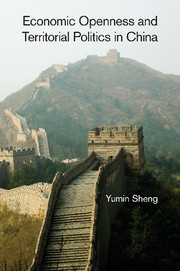Book contents
- Frontmatter
- Contents
- List of Tables
- List of Figures
- Acknowledgments
- List of Abbreviations
- 1 The Territorial Politics of Economic Openness in China
- 2 Globalization, Institutions, and Domestic Territorial Politics: A Theoretical Framework
- 3 Economic Openness and Its Regional Dimension
- 4 Central Political Control via the CCP
- 5 Global Market Integration and Central Political Control
- 6 Consequences for Fiscal Extraction and Economic Growth
- 7 Globalization, Single-Party Rule, and China's Transitions
- References
- Index
7 - Globalization, Single-Party Rule, and China's Transitions
Published online by Cambridge University Press: 10 November 2010
- Frontmatter
- Contents
- List of Tables
- List of Figures
- Acknowledgments
- List of Abbreviations
- 1 The Territorial Politics of Economic Openness in China
- 2 Globalization, Institutions, and Domestic Territorial Politics: A Theoretical Framework
- 3 Economic Openness and Its Regional Dimension
- 4 Central Political Control via the CCP
- 5 Global Market Integration and Central Political Control
- 6 Consequences for Fiscal Extraction and Economic Growth
- 7 Globalization, Single-Party Rule, and China's Transitions
- References
- Index
Summary
INTRODUCTION
So far, I have sought to provide one explanation along the territorial dimension for the broader puzzle posed in Chapter 1 – the resilience of national rule by the CCP-led Chinese central government in the face of the mounting challenges from the country's embrace of economic reform and the global markets. In particular, I have focused on the regionally selective exercise of political control over the subnational governments by the political center via the sole governing political party. Although helping the center ward off the centrifugal tendencies menacing its national rule so far, such territorially targeted exercise of political control by the Chinese political center has also engendered mixed economic consequences at the provincial level.
The empirical evidence for this book mainly comes from one country. Can our argument be relevant to the settings of other countries? What implications does the research have for the broader comparative political economy scholarship on domestic territorial politics of economic globalization and the cross-national literature on the macroeconomic consequences of political decentralization? What light can the focus of this book on the central-provincial political relations in China shed on the role of CCP single-party rule in contouring China's path of economic transition during this period, and more tentatively, in shaping the trajectory of the country's future political transition?
In the remainder of this concluding chapter, I first stress the need to incorporate the incentives of and institutional resources available to the national politicians in studying domestic territorial conflicts under rising global market integration.
- Type
- Chapter
- Information
- Economic Openness and Territorial Politics in China , pp. 221 - 244Publisher: Cambridge University PressPrint publication year: 2010



